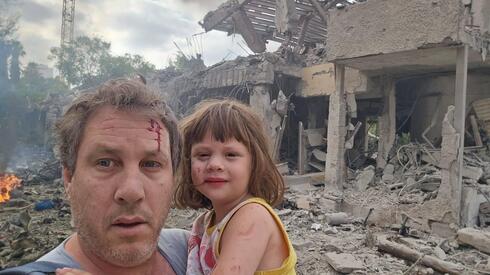“The timing is so strange,” Weits said following the award. “We’re nearing the end of the war, and Nova, in a way, opened it. There’s a kind of brutal full circle here, and I’ve paid a personal price. I’ve spent the past two years documenting this war. Everything hurts. Some things can never be restored. This win is a sad kind of closure—but professionally, it’s still an achievement.”
Weits, Nachshon, and their two children—5-year-old Lili and 3-year-old Asa—were sheltering in the bomb shelter at their home when the missile struck, destroying the house entirely. Years of documentation work, personal belongings, and family memories were lost.
“I’ve been working in documentary for years, and most of the raw materials I’d collected didn’t survive,” Weits said. “The study next to the mamad, where everything was stored, no longer exists. It’s heartbreaking. But because everything was wiped out and the missile fell just two meters from us, I still don’t understand how we’re alive. The nostalgia that can’t be restored is painful—but the sense that we got our lives back surpasses everything.”
The scene of the Iranian missile strike
(Video: Lihi Gordon)
At the start of the war, the family relocated to Eyal’s parents’ home in Haifa. But a week later, they returned to Tel Aviv, believing the mamad at their home would be safer than a shared underground shelter. “Our house was one of the few on the street with a mamad,” Nachshon said. “We felt more secure there.”
At 7 a.m. Sunday, a Home Front Command alert jolted them awake. They rushed the children into the mamad, a tiny space also used as a laundry room. “We sat there texting family that we were okay—then suddenly we heard a boom louder than anything we’d ever heard,” Nachshon recalled. “There was no mistaking it—we’d taken a direct hit. The blast was shocking, the room filled with smoke and dust, and we couldn’t hear a thing. A light fixture fell on my head. I didn’t know what happened to the kids. Then I heard my daughter scream, ‘Why did everything explode? Why did it fall apart?”
When he opened the mamad door, he found their home reduced to rubble. “It was like a construction site. The whole house looked like it had been bulldozed.”
Navigating through the destruction, Nachshon managed to pull his family to safety—first lifting Lili out, then guiding Weits and Asa through the collapsed structure. “There was another siren, but the mamad was gone. I grabbed our phones, passports, and shoes. In hindsight, I would have taken car keys and laptops. We walked out into the wreckage, afraid the house might collapse on us. It was surreal—you’re in your home, but there are no walls.”
For about 10 minutes, the family stood alone in the street. Everyone else was in shelters. “It felt apocalyptic,” he said. “As if we were the last ones left.”
Moments later, he snapped two photos—one of the destroyed house and one holding his daughter Lili. “It was the only thing I thought to do. I couldn’t type a message, so I sent the picture to my family. I had no idea it would go viral. It wasn’t intentional. But when I saw the image, I realized it captured everything.”
Back inside the madam that morning, there had been no hesitation, even when Lili said she was too tired to move. “She didn’t want to go,” he said. “But I picked her up and we went down. You start thinking—what if we had stayed in Haifa, what if I’d let her skip it, what if the dryer had exploded on the kids?”
Weits suffered injuries and was briefly hospitalized. When they returned to the site, they were shocked to discover that some childhood albums, two wallets, and even a laptop had survived. “When you leave the house with your family intact and the kids barely have a scratch, you realize nothing was lost. Things can be replaced. Memories can be rebuilt. It’s a lot of bureaucracy, but the essentials are still with us.”
She added, “I used to see families on the news who lost everything, and I always felt for them. But you can’t truly grasp it until it happens to you. Even when it’s two streets away, it still feels distant. But when it’s your turn, it makes a terrible kind of sense. You realize this risk comes with being Israeli.”
In hindsight, she said, there are two ways to look at it: “On one hand, we were unlucky—what are the chances of a missile falling two meters from you? On the other hand, we were incredibly lucky—that tiny reinforced room saved our lives. I choose to focus on the luck.”









